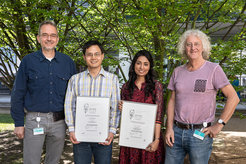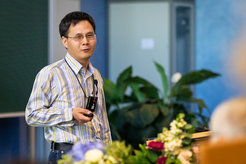Jeff Schell awards for outstanding research
This year, it was junior scientists from Pakistan and China who received awards from the Max Planck Institute of Molecular Plant Physiology

Prof. Dr. Ralph Bock, awardee Dr. Guo-Zang Wu, awardee Umarah Mubeen, Prof. Dr. Mark Stitt (from left to right)
Dr Guo-Zang Wu was awarded for identifying an important stress management factor in plants for intracellular communication
In humans and other mammals, the brain, nervous system and blood circulation can be thought of as the control centre, sensors and information pathways of the body. They are the conduit of information and the means by which actions are initiated. Plants are not equipped with such systems. How then do they detect adverse or even life-threatening environmental conditions, and how do they go about activating defence systems and protective mechanisms? Their internal communication channels are diverse. One level of communication is between the nucleus, containing the genes, and the organelles, termed plastids and mitochondria, which also contain genetic information. The plant cell nucleus is the cellular control centre in which the majority of hereditary traits are encoded. The organelles are primarily responsible for cellular energy production through photosynthesis and respiration. They can send signals to the cell nucleus to initiate the formation of proteins which, among other things, enable the construction of the machinery of photosynthesis and the biosynthesis of chlorophyll in the chloroplasts. Such signals were presumed to exist as far back as 30 years ago. Until now, however, they couldn't be detected, or their molecular identity, clarified.
Dr Guo-Zang Wu's special contribution has been to show for the first time how this type of communication between cell nucleus and organelles actually works. He demonstrated the existence of a protein known as GUN1, which plays a central role in the cell nucleus in forming proteins that are then imported into chloroplasts to counteract stress situations. Dr Wu developed a number of new biochemical and cell-biological approaches to identify and detect the GUN1 protein. The difficulty was that this protein is exceptionally unstable, which is why it's only present in very low concentrations in green leaves, as he showed in an earlier paper. His current work involved plants that are unable to produce the GUN1 protein. As a result, these plants can't transport enough proteins into the chloroplasts. To prevent the lack of protein transport from the cell nucleus into the chloroplasts resulting in cell damage, these plants switch on genes for stress proteins. The findings from this work may pave the way to developing improved crops that are better adapted to unfavourable environmental conditions.

Dr Guo-Zang Wu at his lecture at the award ceremony
Personal portrait
Dr Guo-Zang Wu received his bachelor's degree in Biology from the renowned Shaanxi Normal University in Shanghai. He completed his PhD in Genetics at the Shanghai Institute of Plant Physiology and Ecology in 2010. Dr Wu joined the Max Planck Institute of Molecular Plant Physiology as a postdoctoral researcher in the Department of Prof. Ralph Bock in September 2011. He came to the MPI-MP with a scholarship from the Alexander von Humboldt Foundation. Prof. Bock, Director of the Department of Organelle Biology, Biotechnology and Molecular Ecophysiology, is enthusiastic about Wu's findings: "Dr Wu's work is a real breakthrough. It's taken 25 years to finally elucidate the molecular function of GUN1. Dr Wu's findings have radically transformed our understanding of intracellular communication". No surprise then that Dr Guo-Zang Wu has received several very attractive job offers, and we regret that he is expected to leave the MPI-MP this summer.
The award for doctoral students goes to Umarah Mubeen from Pakistan for research on a protein complex involved in the regulation of growth processes.
The protein TOR is found in animals, fungi and plants and is a central regulator of growth and metabolism in all eukaryotic organisms. The acronym TOR stands for “target of rampamycin”. Although TOR's signal transduction is well characterized in various animals and plants, little is known about its regulatory function in the growth of photosynthetic organisms. Umarah Mubeen's research was on the unicellular green alga Chlamydomonas reinhardtii. The alga is one of the most important model organisms scientists study to investigate the processes of developmental biology and physiology in higher plants. Mubeen's goal was to investigate the molecular and physiological effects of inhibiting TOR. Her method was to perform time-resolved analyses over the entire daily cycle, which showed that such inhibition suppresses growth by 50% and delays the cell cycle. Performing metabolic analyses, she was able to show that a rapid redistribution of carbon occurs within a few minutes after TOR inhibition. In addition, levels of nitrogen-rich compounds, in particular, such as amino acids increased. This indicates that TOR is responsible for controlling the cell’s carbon-nitrogen equilibrium, thereby controlling biomass production, growth and the cell cycle.
Mubeen's first thought was that the accumulation of amino acids was due to the degradation of non-essential proteins or to reduced protein synthesis. Her analytical approach, however, allowed Mubeen to prove that this was not the case. She used stable isotopes to track the transport, production and degradation of component molecules after TOR had been inhibited, enabling her to understand the amino acid accumulation. Contrary to previous assumptions, this was the result of increased nitrogen uptake. The conclusion is that the cell is directly forming new amino acids, a surprising result as forming amino acids costs energy.
As TOR is found in various animals and plants, further work on its function in the alga Chlamydomonas will contribute to closing a knowledge gap spanning yeasts, mammals and photosynthetic organisms, and thus to understanding growth regulation in a huge variety of eukaryotes.

Umarah Mubeen at her lecture during the award ceremony
Personal portrait
Umarah Mubeen studied botany, zoology and chemistry at the University of Punjab, Lahore in Pakistan. After receiving her BSc. in 2005, she completed an MSc. in Botany at Forman Christian College in Lahore in 2007 followed by an MSc. in Industrial Biotechnology in 2010. She arrived at the MPI-MP in 2014 for an internship, financed by the "Green Talent" scholarship of the German Federal Ministry of Education and Research. She completed the internship so successfully that she was subsequently offered a position as a doctoral student at the International Max Planck Research School (IMPRS). Her PhD supervisor Dr Patrick Giavalisco, head of the research group Experimental Systems Biology, applauds his doctoral student for "her great passion for plant research, which has often led to fruitful scientific discussions opening up new perspectives, not only for her own research topic, but also for those of other members of the group, making her a very innovative member. She is a hugely talented and dedicated scientist who has been highly independent and self-reliant in performing her research".
The awards bestowed on the two scientists were made possible by a generous donation from BASF.
Jeff Schell, after whom the award was named, revolutionized plant research.
The awards commemorate the Belgian molecular biologist Jozef Stefaan (Jeff) Schell (1935–2003). He studied zoology and microbiology at the University of Ghent, where he worked as a professor from 1967 to 1995. From 1978 to 2000 he was Director and head of the Department "Molecular Foundations of Plant Breeding” at the Max Planck Institute for Plant Breeding Research in Cologne.
Schell was one of the pioneers of biotechnology. As a microbiologist, he was interested in the interactions between plants and soil bacteria. His research into the origin and development of plant tumours showed that Agrobacterium tumefaciens, a common soil bacterium, can integrate genes into plants. His research has led to the development of techniques to selectively introduce genes into plants.
The ability to transform plants has since revolutionized plant research. It has allowed plant scientists throughout the world to determine the function of genes and, hence, to a greater understanding of metabolic processes and plant growth and development.
URS/UG


